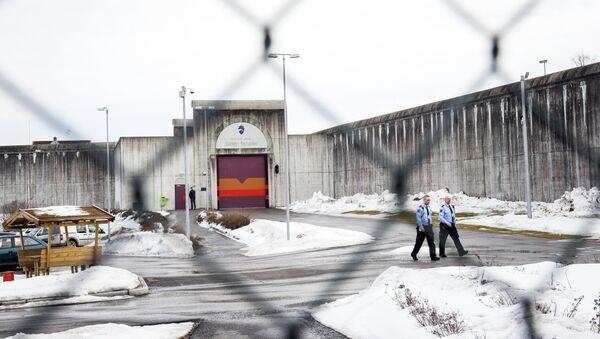"We hope that the state wins this new round and that justice manages to dig deeper into the case," Lisbeth Kristine Royneland, the head of the family support group, whose own 18-year-old daughter was shot dead by Breivik in the killing spree on Utøya island, said as quoted by Swedish Radio.
At present, 37-year-old Anders Behring Breivik is imprisoned in a 31.5-square-meter three-cell complex in Skien. One of the cells is used as a living room, the other as a studio, whereas the third one is a gym. This is an improvement compared with his former dwelling in Ila prison complex, where the cells only were about eight square meters each, Norwegian daily Dagbladet reported.
Breivik is allowed to move freely between the cells between 07:30 and 19:30. Each cell has a window reached by daylight. The main cell has a toilet, washbasin, shower, desk and chair, as well as a TV-set with an integrated DVD player, a video game console, closet, refrigerator and bed. Breivik is allowed to cook and wash clothes. He also has access to a computer without internet connection as well as an electric typewriter. Breivik is also allowed to read books and newspapers. The training cell has a treadmill, an exercise mat and several training devices.
Beyond these seemingly comfortable material conditions, a district court judge had previously ruled that security measures took excessive precedence over human rights. Breivik was found to be kept "in a prison within a prison," with insufficient social activities. The court ruling also questioned the numerous strip searches, the systematic use of handcuffs and other frequent awakenings at night, especially in the early days of his imprisonment, as "potentially humiliating."
Breivik's mother was the last person outside of the prison personnel who visited her son shortly before her death of cancer in 2013. Breivik reportedly stopped contact with other family members. According to court documents, he also stopped communicating with a woman, with whom he previously conducted 99 supervised telephone conversations, each of them about 20 minutes long.
On July 22, 2011, Breivik carried out two attacks, first killing eight people at the foot of a government building in Oslo with a bomb. Then, disguised as a policeman, he went on to kill 69 participants in a Labor Party youth camp on the Utøya island. Breivik, who later claimed he killed his victims because they valued multiculturalism, was handed a "life sentence," which in Norway actually means 21 years in prison, a term that can be extended if he is still considered a threat.





